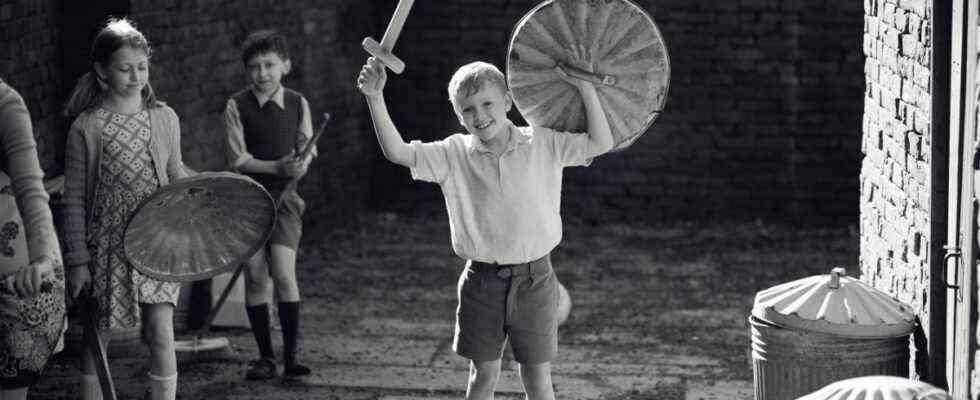A heart that knows only one purpose is turned to stone, says a poem by William Butler Yeats about the Easter Rising in Dublin in 1916. Though a Protestant himself, Yeats was a fervent supporter of Irish independence, and yet he was dismayed the outbreaks of violence: Not like that. Northern Ireland remained part of the United Kingdom at the end of the war that soon broke out. Kenneth Branagh’s film “Belfast” is about the troublesthe Northern Ireland conflict, from a very personal, child’s point of view – the director is in the middle of the troubles grew up. At the end of “Belfast” one does not know which path he would have liked for Northern Ireland, but one thing is clear: not like this.
It is 1969, little Buddy lives with his brother and his mother in an idyllic setting: his grandparents and extended family are always around him, he has fallen for a girl in his class and the people on his street look out for each other. There is one downer, the father only comes at weekends, when he is flown in from England, where people are urgently needed for whom there is no work in Belfast. One day, this idyll literally flies over Buddy’s ears. Both Protestants and Catholics live on the street, and the latter are now being evicted from their homes. Nine-year-old Buddy has to talk to his cousin about how to spot Catholics, the Unionists who have been attacking Protestant homes are demanding some sort of protection money from his father. Then, according to the father, someone who has always made a living from crooked things, discovered a new crooked thing.
“Belfast” was nominated for seven Oscars, including Best Picture and Best Director
One could now object that Branagh’s film remains almost exclusively among Protestants, and does not depict large parts of the conflict, such as the IRA, at all. An apolitical film, but children don’t sort things out politically. The Shakespearean specialist and self-confessed fan of light entertainment Branagh was himself born in Belfast in 1960, like his main character Buddy; his father worked in England, as did Buddy’s. There are subtle references to the very same cultural imprints that Buddy’s creator has infused into everything else he does, from theater to Thor (the 2011 Marvel film adaptation was directed by Branagh). And just like the family in the film, Branagh’s family eventually evaded events and just walked away, leaving the wreckage of Belfast behind. So you can guess where the story is going, but it’s so touching and funny at the same time that it really doesn’t need a surprising ending.
“Belfast” was nominated for seven Oscars, including Best Picture, Best Director and Best Original Screenplay. “Belfast” is a wonderful little masterpiece, somewhat autobiographical but not quite. Aside from a few stutters, Branagh shot the film in black and white, as if aware that his memory lacks some nuance and the light is much sharper in definition. Did the grandparents, played by Judi Dench and Ciáran Hinds, really strike the perfect balance of dry humor and wisdom? Were the parents that Branagh cast with two extremely beautiful people, Caitriona Balfe and Jamie Dornan, really smart enough to see through every wrong from afar? Maybe he idealized her, but that doesn’t matter. Then you don’t have to believe that little Mr. Branagh was a thoroughly charming, smart-ass kid like Buddy (Jude Hill), but it’s about something much bigger than a personal story. It’s a look back, proud to find beauty and harmony in an environment that tries to overwhelm both. His omission of the political background is actually an attitude. The world may seem like there are only two sides to everything, but for Branagh there is a third in “Belfast”: the one that simply refuses any escalated argument.
Van Morrison songs overlay it all, and it doesn’t matter if they’re all really timely – this music is a feeling of reassuring ease between roadblocks. Most filmmakers would probably relate their childhood memories of a war as a stroke of fate. Branagh’s story is about how violent neighborhood guys failed to spoil his happy childhood.
Sometimes it’s funny, in a way that also hurts a bit. In one great scene, little Buddy, who actually let his cousin drag him along to loot a supermarket run by Catholics, stands in front of his mother with a stolen packet of washing powder and is told to justify himself, and he only has one answer: “It’s organic Washing powder!” She then drags him back to the supermarket with the package.
“Belfast” sometimes almost tips over into the surreal. For example, when a funeral almost turns into a musical number, or a fight at the barricades that looks almost like the showdown from “High Noon”. At some point you hear the yell “Made it, Ma! Top of the world!” at dawn without seeing who is actually yelling. That’s what James Cagney shouted as the crime boss at the end of “White Heat” before he blew himself up with a gas tank surrounded by the police. Very apt association for Belfast, 1969. And again and again the same door opens for Buddy to escape from any kind of oppressive reality: comic books, “Enterprise” on TV, a brightly colored scene from “Chitty Chitty Bang Bang” in the cinema. That’s actually a terrific conclusion for childhood memories with a significant shadow: Whatever happened, it made him the person he is.
Belfast, UK 2021 – Directed and Written by Kenneth Branagh. Camera: Haris Zambarloukos. Starring: Jude Hill, Caitriona Balfe, Jamie Dornan, Ciaran Hinds, Judi Dench, Colin Morgan, Lara McDonell. Universal Pictures, 99 minutes. Theatrical release: February 24, 2022.

